We're all guilty of pouring leftovers down the sink instead of cleaning them up from time to time. It's much easier, and can't really do any harm...can it?
While your drains may be able to keep up for a while, it's only a matter of time until all that grease and grime clogs them up for good.
Here are 10 things you should never, ever pour down the sink, however lazy you might be feeling!
STOP! Before continuing, make sure you sign up to the Expert Home Tips newsletter to get all the best home hacks, living tips, competitions and more.
1. Don't put flour down the sink
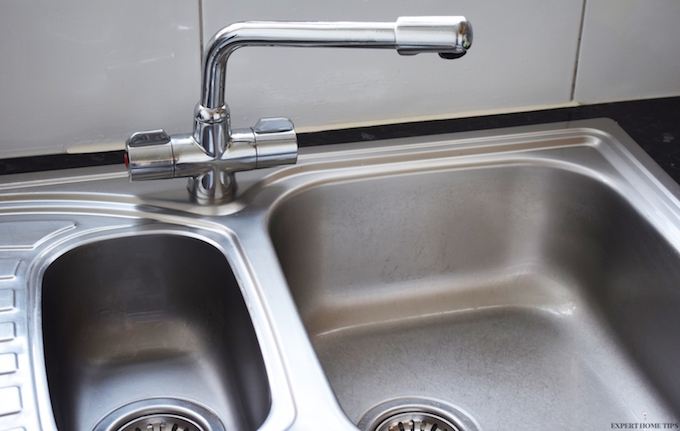
If this isn't a wonderful excuse to 'lick the bowl' I don't know what is.
If you've ever made a cake, you'll know what happens when flour meets liquid - a bit, gloopy mess. Now imagine that happening on the inside of your drain - not very conducive to a clear flow of water, right?
Flour is something you should never put down your drain if you want to avoid a messy drain blockage.
2. Milk should not be put down the drain
This one is a little surprising, to say the least.
Putting milk (or any other dairy products for that matter) down the drain can have serious environmental consequences. So serious in fact, that UK businesses can actually be fined for doing it.
This is because milk requires large quantities of oxygen to be broken down into the environment, depriving other organisms of the air they need to survive.
Next time you buy milk products, make sure you check the expiry date and give yourself plenty of time to consume them. You'll be doing your drains, and the environment a favour!
3. How to dispose of coffee grounds
There are loads of things you can do with coffee grounds, but throwing them down your drain isn't one of them.
Coffee smells so delicious that it's easy to think it may actually freshen up your dirty drain, but in reality, it will only cause problems.
Coffee grounds stick together, and can easily block your pipes after time. A much idea is to add them to your compost heap - your plants will love them.
4. Small fruit & veg stickers can cause big problems
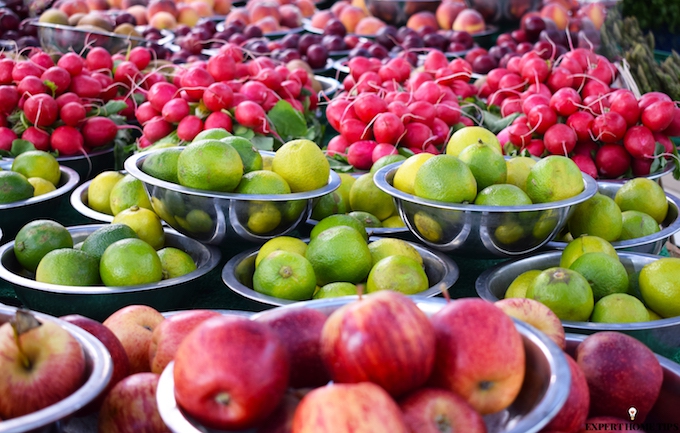
Hopefully, our savvy readers are sensible enough not to do this anyway, but if you are ever tempted to throw fruit or veg stickers down the drain, please don't.
These sticky little bits of plastic may not look very harmful, but they'll take years and years to compost down - bad news for your pipes, and the environment too.
5. Small seeds & grains can cause problems too
Speaking of small items, seeds nuts and grains can also cause a problem for our drains.
This applies to generic things like corn kernels, cherry pits and more specifically, chia seeds, which expand in water - a nightmare for your drain pipes to deal with.
If you want to keep your pipes clear, be mindful of seeds, pips and grains, no matter how small they are!
Do not put them down the drain, but instead throw them in the bin or add them to your compost. Some seeds can even be tossed out for your feathered friends, who will no doubt appreciate the tasty treat.
6. Bones belong in the bin
Even if you have a very efficient garbage disposal system, it still won't be any match for bones.
The odd fishbone here and there is fine, but bigger bones from poultry and larger animals will make blades blunt and weaken the machine's mechanics. This will cause it to become much less efficient much sooner than it should.
As bones will rarely be broken down completely, they are likely to clog pipes, which will prevent other liquid from filtering through.
7. Can I put pasta & rice down the drain?
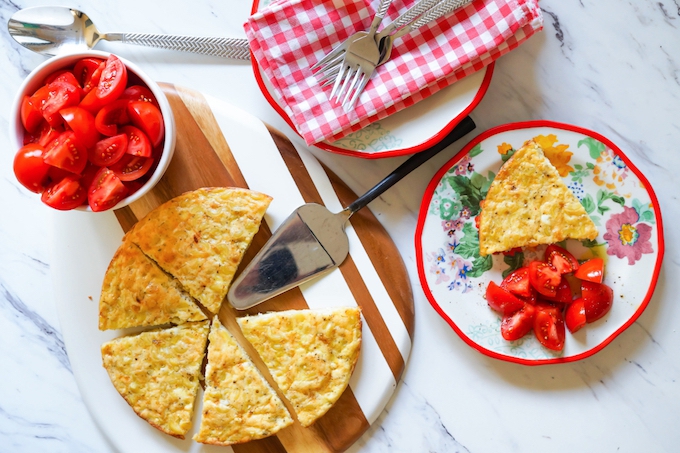
We've all heard of starch, but what does it mean for our drains?
It's not good news I'm afraid. Pasta and rice will continue to absorb liquid even after being cooked, thus turning into a stodgy, sticky mess which is hard to break down.
If you have managed to resist eating all your pasta (unlikely if you're anything like us), either portion it up for the next day, or pop it your food waste disposal bin.
The Pioneer Woman has some wonderful recipes calling for leftover pasta if you're in need of inspiration.
8. How to dispose of your pumpkin
Carving a pumpkin always sounds like a great idea, until it comes to cleaning up.
Getting creative may be fun, but the stringy, orange mess you're left with certainly isn't. All that gunk is difficult enough for a human to clean up, so just imagine the difficulty it poses for your drains!
Donate your pumpkin innards to the compost heap or check out Wide Open Country's clever recycling ideas if you're feeling adventurous.
9. Where can I safely dispose of medication?
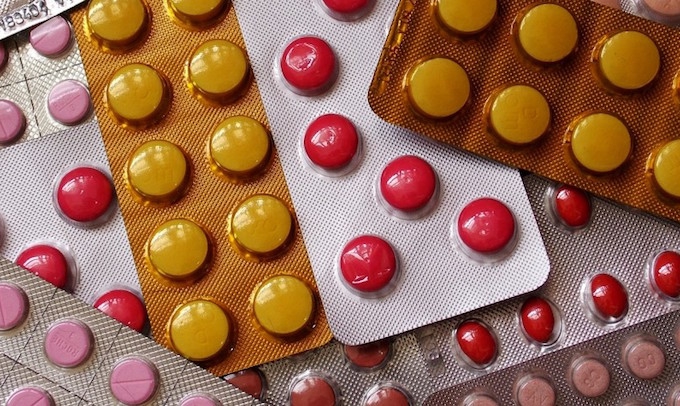
The answer to safe medication disposal is certainly not your kitchen sink.
Pills, although tiny, are one of the items that should never be put down the drain under any circumstances. This actually has nothing to do with clogging, but more so, the environment.
Medication is designed for humans. Their contents can be extremely damaging to the environment and poses a great threat to aquatic life and other animals.
Your local Pharmacy will be more than happy to take medication that's no longer required off your hands. Drop it off next time you're in town.
10. What does oil & fat do to my drain?
Have you ever left a pan to cool, and noticed it turn into a thick, solid, white substance?
This is often what happens to the fat and grease your pour down your sink when it is allowed to cool - it solidifies into something resembling lard you can buy from the supermarket.
Unsurprisingly, this causes issues for both your own drain, and even for water treatment plants later down the line.
Don't put fat and grease down your drain if you can avoid it. Instead, wait for it to cool, and use kitchen roll to wipe it away and dispose of it in the bin.
11. Don't pour paint down the drain
Given the house a new lick of paint? Your kitchen sink may seem like the obvious place to dispose of any leftovers, but it could cause real damage.
Your drain is not a garbage bin. It's important to always bear in mind that whatever you put down it may eventually end up in the ocean.
Whilst water treatment plants do a good job of removing many harmful chemicals, they cannot always eradicate everything.
Paint is highly toxic, and to prevent the environment from becoming contaminated, it should never be poured down the sink.
12. Can you put eggshells down the drain?
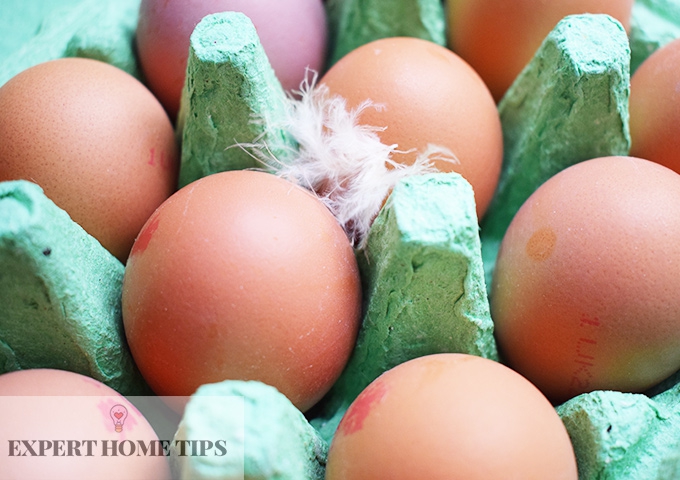
Some people claim putting eggshells down the garbage disposal is actually beneficial. They claim the small, sharp particles work to sharpen blades and even enhance the performance of the machine.
However, as with most things, there are two sides to every story. The general, professional consensus is that egg shells are better off in the bin. When ground, they turn into a rough, abrasive, sandpaper-like substance which can actually blunt the blades.
If you don't have a garbage disposal unit at all, egg shells definitely shouldn't be going down the drain. Although they may look fragile, they can easily cause an obstruction in your pipes.
For 21 things you can do with eggshells, check out Colleen's article.
Have you ever had any bad experiences with clogged drains? What was the culprit? Let us know in the comments below.
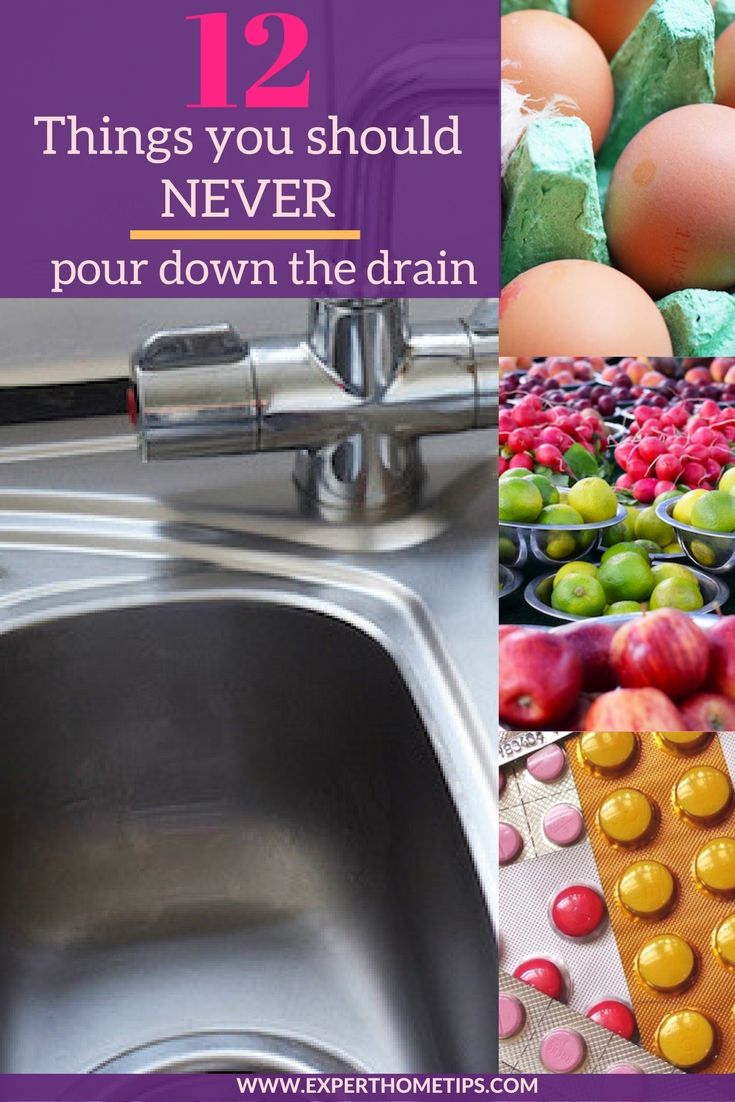
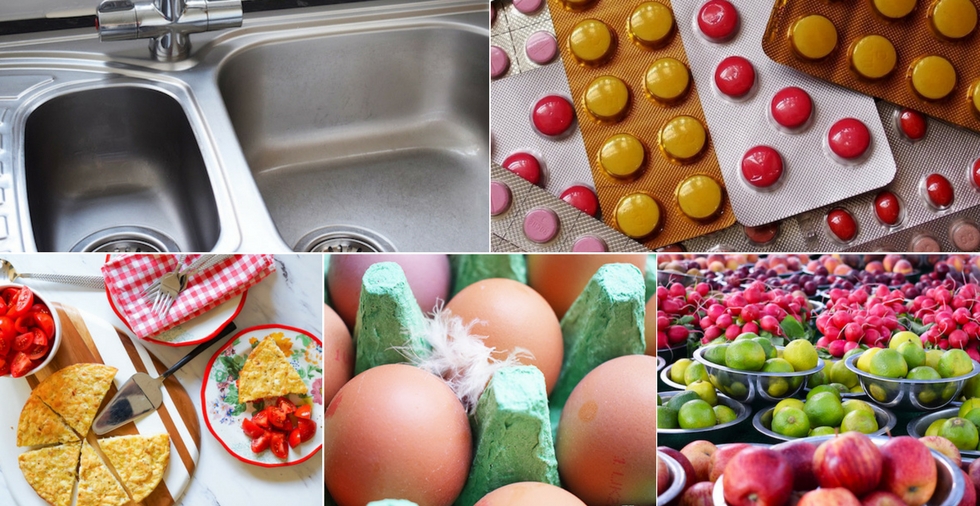
No. 3 is actually quite WRONG!! A small amount of coffee grounds down the sink helps to clear fatty deposits from the pipes. Fat globules will stick to the individual coffee grounds and be washed into the sewer.
Hi Dayman. Please refer to Atomic Plumbing & Drain Cleaning's article who clearly state that coffee, in fact, does the opposite. https://www.atomicplumbing.com/plumbing-news/is-it-safe-to-dump-coffee-grounds-down-the-sink/
you can take all of this and put it in a book, call it guide to be real with nature.... or how not to ruin your house and the world....
Hi Lilach. We would love to have a book but it's not something we currently have time for! Our blog keeps us very busy :)
Having scraped off any large accumulation of leftover food, it's a good idea to wipe dishes over with kitchen towel before washing them, that way you get rid of most of the residue that can accumulate, block your drains and contribute to "fatbergs" in the sewage system. Note that I say MOST of the residue, you're unlikely to get rid of all of it, so it's important to wash dishes in very hot water with plenty of detergent, the main culprits are egg yolk residue, fat from bacon, sausage and the like and gravy, particularly when mixed with vegetable residue, so if you can remove the bulk of it BEFORE you wash the dishes it will at least minimise any environmental damage, including blocked drains. Arguably, it's even more important to wipe over dishes if you're using a diswasher as the accumulatiion can go largely unseen until it's too late. Another item that I've found particularly helpful is a wire mesh drain strainer (they're not expensive and obtainable from most half decent hardware stores), this sits over the plughole of the sink and catches not only larger debris but any fatty material that clings to that debris you can then tap the accumulation out into a bin or onto, say, a piece of cooking foil...I also use a drain strainer in my shower to catch loose hair and prevent that from clogging up the outflow, particularly as things like conditioner seem to act as a glue to bind the hair into a very effective dam! A while ago I had to unblock my outflow when a large ball of congealed hair and other material, mostly conditioner by the look of it, caused a total blockage, I actually had to unblock it from the outside pipe and, yes, you've guessed it, I got soaked when the water trapped behind it was released...an ounce of prevention versus a pound of cure and all that.
Hi Donatello. First and foremost, from the whole team at Expert Home Tips, we hope you had a wonderful Christmas and a big Happy New Year! Thanks a lot for all your support in 2017. I also use a drain strainer in my shower - it saves so much hassle and makes cleaning much easier. Sorry you had to struggle with a hair-ball mess!
This is a little later, but saying you should wipe your dirty dishes with a kitchen towel before putting in the dishwasher will result in less clean dishes. Dishwashers determine how dirty the dishes are and then cleans accordingly. If they don't detect enough residue, it doesn't do as good a job if the dishes are not dirty enough. That's why manufacturers tell people to not rinse their dishes off, only scrape off large pieces of any food on them. Then, there is the fact that the dish towel will need to be washed and the stuff wiped off the plate will go into your drain system anyway.
Hahaha dishwashers cannot determine how dirty your dishes are. When you can explain scientifically how your dishwasher knows how dirty your dishes are then we will believe you. Guess where all that food and grease ends up? In your clogged drains.
Lol. You seriously think that a dishwasher can't sense varying loads when a washing machine can? It's impossible for drain sensors to exist in a world where we have cars that park and drive themselves? What's the weather like in your cave?
I didn't know that oil should never be poured down the kitchen drain! I didn't know that it can solidify in the drain. That sounds like it would cause a lot of problems, especially if you do it often. I will have to be careful not to pour any oil or fat down the drain. Thank you for all the information!
Hi Deb. I'm glad we've been able to teach you something new today! Hopefully your drains will stay much clearer from now on :)
I am very surprised that lady did not know that oil floats on water has she never heard about oil slicks
My daughter clogged our drain with soya wax. She was early days experimenting making scented melts & candles and hot washed her pots. Same result as fat but much more solid block.
Oh dear! Thanks for sharing, Carol! How did you go about fixing it?
I use used tea bags to soak up cooking oil before putting them in my food recycling bin. Just put a few in a dish and pour the oil in, also wipe oil off dishes with a used teabag before putting them in the dishwasher.
That's an interesting idea, Lesley! I'll have to give it a try.
Egg shells should be put on the compost heap or flower/vegetable beds. Of course, the bin is the proper place if you don't have a garden.
That's a great idea, Chris! They really help give the soil nutrients.
My tip is to line the grill pan with grease proof paper to catch the fat and after it has cooled I put it in the bin. Think grease proof is more environmentally friendly then foil that doesn't decompose.
That's a good idea, David!
I used the link to 21 things you can do with eggshells - and Number 10 tells me: "Use eggshells for Drain cleaner If you've got some crushed eggshells lying around, sprinkle some into your sink strainer. They will help to trap bits of food and keep your pipes nice and clear." I think there's confusion at Expert Home Tips!
Hi there! The suggestion here is to keep some large pieces of eggshell in your sink strainer (the bit that is meant to catch food). This is supposed to stop those smaller bits of food from slipping through the strainer while still allowing water to trickle through. We don't suggest that you put them down the sink. I hope that clears it up!
I'm feeling reasonably happy about my behaviour, but the one thing that did pull me up was the "No Milk" bit. I also recycle my plastics (the milkman doesn't deliver in my area), so what do I do with the small quantity of milk when I rinse out the bottle? If I put the dirty bottle in the bin I contaminate the whole load, if I put it down the drain I kill the environment. HELP
Hi Zilpa! This is more for large quantities of milk - say you had a large quantity left when it expired, for example. A small amount won't be as bad for the environment. If you are concerned, you could rinse the excess and pour into a non-recyclable container and put it in the bin. You could save something like a crisp packet or a sandwich bag for this purpose and then tie it up to keep the liquid inside.
I to never knew pouring milk down the sink was bad. I live alone and sadly I throw a good bit of milk away as I can never use it up fast enough. I think I've done this my whole life never heard this before.
Instead, you can try to use your milk before it goes bad, freeze it for later use, or consider smaller quantities when purchasing milk. Additionally, there may be local options for recycling or composting milk.
I always pour any fat into a tin then put tin in bin when full so easy to do and no blocked drains.
Are you otherwise unable to recycle the tin? It might be worth looking for a non-recyclable option to fill with the fat to minimise waste. Otherwise, that is great to hear!
As regards to disposing of tablets, no chemists will take unused medication in my area, so what should I do with them
That is unusual, Patricia! I have never had any problems with taking unused medication to my local pharmacy. Did they give a reason why? Have you tried a Boots pharmacy?
no food waste gets into my dishwasher as the dog licks every plate (yes, even curry!) and the dishwasher then efficiently cleans off dog-lick
Hi Diana! I would make sure you're using the highest possible temperature setting. Otherwise, there could still be some bacteria on the plates!
Please please dont not put all your kitchen waste down the drains we recently had blocked drains, NOT due to our household I may add. Unfortunately a neighbour was the culprit. We put all our kitchen waste ie coffee grounds , egg shells, vegetable peelings etc in the compost bin add the torn up egg boxes(remove the labels) this will help add extra nutrients to your compost. We are also careful to keep any fats leftover from cooking including gravy etc which we add to a big dish of leftovers to feed our lovely foxes who visit us every evening they enjoy a meal of meat & pasta with all our scrapings from our plates so nothing goes to waste.
Composting kitchen waste instead of putting it down the drain can help reduce blockages and create nutrient-rich soil for gardening. Feeding leftover food to wildlife is also a great way to reduce waste and support local wildlife.
The birds will eat rice and I guess any other type pasta and are jolly pleased with it for a breakfast, makes a change from bread;/
Thanks for sharing!